Episodes
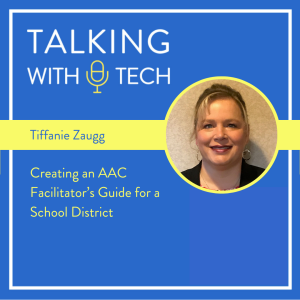
Wednesday Sep 06, 2023
Wednesday Sep 06, 2023
This week, Chris interviews Tiffanie Zaugg, a PhD Graduate student and former AAC Coordinator for a school district in Iowa. Tiffanie shares about the “AAC Facilitator’s Guide” that she created in her former school district, a staff resource they could go to with descriptions of many of the concepts she was frequently describing to SLPs and teachers on a regular basis, e.g. core vocabulary, modeling, importance of having a light backup. Tiffanie shares about making this handbook, the SMART Partner strategy, her current work teaching pre-service teachers, and more!
Before the interview, Chris shares some ISTE takeaways with Rachel, including seeing more sessions where inclusion was embedded in the learning, going to an AI “Demo Slam” (i.e. demonstrations of tools), and a session about using role playing games (e.g., Dungeons & Dragons) to develop story telling skills!
Key ideas this week:
🔑 In a table top role playing game, the players must describe what they want to do, and the Dungeon Master has to describe what happens as a result. This activity works on a student’s narrative skills, imagination, descriptive skills, and problem solving - all in a format that is highly motivating for learners!
🔑 In her AAC Facilitators Guide, Tiffanie included the “SMART Partner Strategy,” which stands for: Stop interruptions; Model; Avoid asking excessive questions; be Responsive; & wait Time.
🔑 When teaching descriptive teaching, consider having students describe a common object (e.g. strawberries) in an AI text-to-picture generator and seeing if the AI makes a picture of that item!
🔑 Tiffanie’s AAC Facilitator’s Guide includes a Communication Partner Work book with a gesture dictionary. This gesture dictionary is a space to note the meaning of any gestures that are unique to that student that will travel with them as they progress in their education.
Links from this Episode:
D&D In Schools: Communal Storytelling in Classrooms by Matthew Winters and Dan Ryder - https://www.teacherwinters.net/istelive-2023/dndinclassrooms
Rewordify.com - Simplifies difficult English and more.
TextCompactor.com - Free online automatic text summarization.
Skybox by Blockade Labs: Free background/scene generator.
Visit talkingwithtech.org to access previous episodes, resources, and CEU credits that you can earn for listening to TWT episodes!
Help us develop new content and keep the podcast going strong! Support our podcast at patreon.com/talkingwithtech!
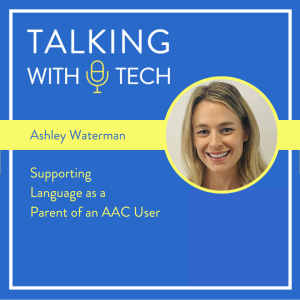
Wednesday Aug 30, 2023
Wednesday Aug 30, 2023
This week, we share Rachel’s interview with one of her clients, Ashley Waterman! Ashley is the parent of three boys, including her youngest, Liam, an AAC user who has a rare genetic disorder, Cohen syndrome. Ashley is passionate about connecting families with children with special needs to essential resources, and is a board member of the Cohen Syndrome Association. Ashley shares about the struggle to get Liam diagnosed, Liam’s amazing progress using AAC, ways they have incorporated modeling into the home routine, and more!
Before the interview, Rachel and Chris connect with Rachel's Office & Digital Media Manager, Monica Halschishick! Rachel and Monica discuss how they came to work together, how Monica decided to go to grad school for Speech-Language Pathology, and some tips and tricks for improving digital marketing!
Key ideas this week:
🔑 There are times where Liam requests things he can’t have, and Ashley makes sure to communicate to Liam that what he wants isn’t available. We can’t always give a child what they want, but it goes a long way for us to hear them and acknowledge what they are saying, even if the answer is “no”.
🔑 Liam likes to explore his devices sometimes, like pushing “g” and “o” because he likes circles. Sometimes people will say that an AAC user is “stimming” when a child explores a device and will try and stop it, but allowing AAC users to explore their device honors their communication and supports the visual lexicon.
🔑 Asking permission before we take a device away from an AAC user is really important, even when modeling. While it isn’t always possible to do, having a second device for modeling in the home for the family gives the AAC user more personal autonomy over their AAC device.
🔑 Many children have anxiety in some speaking situations - for kids with disabilities, a lack of communication may be misunderstood as a lack of ability, when in fact they are just nervous.
Visit talkingwithtech.org to access previous episodes, resources, and CEU credits that you can earn for listening to TWT episodes!
Help us develop new content and keep the podcast going strong! Support our podcast at patreon.com/talkingwithtech!
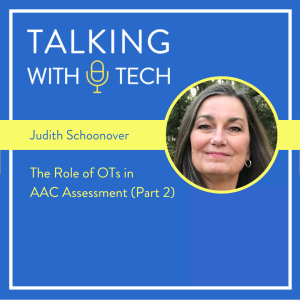
Wednesday Aug 23, 2023
Wednesday Aug 23, 2023
This week, we present part 2 of Chris’s interview with Judith Schoonover, an occupational therapist who, along with Chris, was a founding member of the Louden County School District AT Team. This week, Judith talks about the role of the occupational therapist (OT) in the AAC device selection process, the importance of collaboration between team members during that process, and more!
Before the interview, Chris shares about doing an AAC training for bus drivers in his school district, and how the word “salad” created an “aha” moment for the group! Chris also discusses doing teacher trainings during the extended school year, including some teachers who thought they knew AAC better than they actually did.
Key ideas this week:
🔑 OT’s can be helpful with the assessment process by helping figure out things like motor access, as well as the ability of the student to directly select icons comfortably and successfully.
🔑 Some OTs want to jump directly from “this student has difficulty with direct selection of icons on an AAC device” to “this student needs an eye gaze device” without taking the time to understand what is causing the problems with direct selection.
🔑 Standardized testing doesn’t give the whole picture for OTs or SLPs. There are uses for standardized testing, but it is more important that we presume potential and take the time to better understand a student’s strengths and weaknesses.
Links:
WATI Assistive Technology Consideration to Assessment - https://www.wati.org/free-publications/assistive-technology-consideration-to-assessment/
Communication Bill of Rights - https://www.asha.org/njc/communication-bill-of-rights/
Visit talkingwithtech.org to access previous episodes, resources, and CEU credits that you can earn for listening to TWT episodes!
Help us develop new content and keep the podcast going strong! Support our podcast at patreon.com/talkingwithtech!

Wednesday Aug 16, 2023
Wednesday Aug 16, 2023
This week, Chris interviews Judith Schoonover, an occupational therapist who, along with Chris, was a founding member of the Loudoun County School District Assistive Technology Team. She shares about the importance of focusing on the specific needs of a student during assessment, not just their label; the consistent move of technology from special education to general education, her history as an AT “maker”, ideas for supporting maker groups in your area, and more!
Before the interview, Chris and Rachel catch up about Rachel’s work during the summer with clients doing “intensives.”! Intensives in Rachel’s practice involve having the entire communication parter team, along with the AAC user, attend three 90 minute sessions per week for two weeks. This is followed by three more sessions with just communication partners to train them further on how to be an effective communication partner using the information learned the previous two weeks. Rachel also discusses her new literacy intensive, and the positive results she has been getting from them as well.
Key Ideas This Week:
🔑 When people request assistive technology using broad terms (“What app is good for Down Syndrome?”), we should guide them towards figuring out the task that needs to be done and then help them feature match for those specific needs.
🔑 There is always a move for assistive technology to become more widely adopted in general education; for example, computers were initially only given to students in special education, while now many districts have 1:1 computer initiatives. When supporting kids in special education who use a particular AT tool, try and consider if the tool is something that would be of benefit to kids in general education as well.
🔑 Judith likes quick AT solutions using Therese Willkomm’s “make in a minute” strategy, which capitalizes on the momentum we feel when we first start a project. She advocates for using notepads, squeeze balls, pool noodles, and more to quickly create helpful AT solutions. That way, the maker builds confidence in their skills and the district builds capacity. Watch more at https://www.youtube.com/watch?v=ZNpOeH4jnC4
🔑 Judith works part time on the Assistive Technology Outcomes & Benefits journal, ATIA’s open-access, online, annual publication of peer-reviewed papers. Sign up for this free journal at https://www.atia.org/home/at-resources/atob/
Visit talkingwithtech.org to access previous episodes, resources, and CEU credits that you can earn for listening to TWT episodes!
Help us develop new content and keep the podcast going strong! Support our podcast at patreon.com/talkingwithtech!
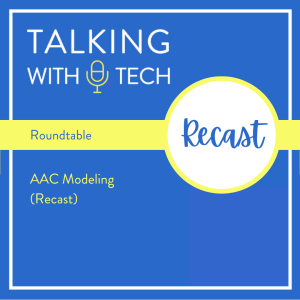
Wednesday Aug 09, 2023
Wednesday Aug 09, 2023
In this “Recast” episode of Talking with Tech, we share a remastered episode that was previously aired on the podcast. This episode, Chris Bugaj, Rachel Madel, and Lucas Stuber have a roundtable discussion about the key components of aided language stimulation, i.e. modeling. This means that the the communication partner uses the same communication system as the AAC user to model communication exchanges.
Key ideas this week:
🔑 AAC is a visual language, and we can’t expect an AAC user to understand when and how to use AAC if they can’t watch someone else use it first. As Rachel says, “You want to create an AAC world, and go live in it.”
🔑 Research indicates that aided-language stimulation helps an AAC user to increase the length of their utterances, improve their vocabulary, and increase their use of grammatical endings. Samuel C. Sennott, Janice C. Light, and David McNaughton -102 Research and Practice for Persons with Severe Disabilities 41(2)
🔑 Just like when we talk to babies without expecting them to talk back, we need to provide AAC users with a lot of modeling opportunities without expecting a response. Even if we think an AAC user isn’t listening to us, we should continue to model to them without expectation.
🔑 Descriptive teaching of AAC is a strategy where the communication partner teaches concepts behind context-specific fringe words using high frequency core words. For example, rather than teaching an AAC user about photosynthesis using lots of scientific words, you can use core words to teach the concept (e.g., “The sun goes on the plant and the plant makes food.”)
Visit talkingwithtech.org to access previous episodes, resources, and CEU credits that you can earn for listening to TWT episodes!
Help us develop new content and keep the podcast going strong! Support our podcast at patreon.com/talkingwithtech!
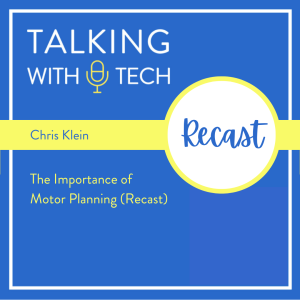
Wednesday Aug 02, 2023
Wednesday Aug 02, 2023
In this “Recast” episode of Talking with Tech, we share a remastered episode that was previously aired on the podcast. This episode includes Chris Bugaj’s interview with Chris Klein, a full time AAC user, disability advocate, and mentor. They discuss Chris Klein’s presentation at ATIA about motor planning and the “external lexicon” of AAC users.
Before the interview, Chris Bugaj, Rachel Madel, and Lucas Steuber discuss some of their thoughts about motor planning and what they have seen in their practice that supports the need for motor planning in robust AAC systems.
Key ideas this episode:
🔑 Chris Klein advocates for the largest vocabulary possible at the start to begin developing a motor plan with their AAC as soon as possible. It is important to consider a user’s motor plan long term. If you give them 8 buttons to start, you will need to keep expanding the page, which changes the motor plan around. It’s better to start AAC users on a larger grid size at the start so we aren’t constantly changing the buttons around.
🔑 Chris Klein shares that people who use AAC have both an internal lexicon (words in their head) and an external lexicon (whatever AAC device a user has in front of them). An AAC user’s layout must be well thought out in advance, because if there is no motor plan and looking for a button takes too long, the aac user may forget what they wanted to say or will otherwise limit their utterances. This could potentially slow down language development overall.
🔑 For the most part, Chris Klein believes that goals for AAC users are set too low. The goal should be learning to use language spontaneously, not just communicating basic needs and wants.
Visit talkingwithtech.org to access previous episodes, resources, and CEU credits that you can earn for listening to TWT episodes!
Help us develop new content and keep the podcast going strong! Support our podcast at patreon.com/talkingwithtech!
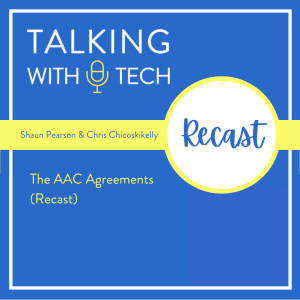
Thursday Jul 27, 2023
Thursday Jul 27, 2023
In this “Recast” episode of Talking with Tech, we share a remastered episode that was previously aired on the podcast. This episode includes Chris Bugaj’s interview with Shaun Pearson and Chris Chichoskikelly about the AAC Agreements, a set of “better” practices around AAC that were crowd sourced from stakeholders in the area of AAC at the ATIA conference in 2016 and 2018. You can learn more about the AAC Agreements here!
Before the interview, Chris Bugaj, Rachel Madel, and Lucas Steuber discuss some of the key beliefs that they have around AAC and how they try and follow these guidelines within their own practices.
During the interview, Chris, Chris, and Shaun discuss the following "AAC Agreements":
1. The student should have access to their communication system even while engaging in academic or leisure activities.
2. Everyone is a multi-modal communicator. A communication system should include multiple modalities.
3. There should always be a light tech option as part of an AAC system.
4. Motor planning is an important consideration of an organizational structure of an AAC system.
5. The communication system should allow for multiple pragmatic functions.
6. Core vocabulary should be taught.
7. Modeling (aided language stimulation) all day, every day is desired in AAC, with no requirement of a response.
8. Modeling should allow for growth in the individual's communication.
9. Modeling should be used to facilitate growth in communication.
10. Accept any mode of communication as valid, as long as your communication partner understands what it means. Don't require individuals to repeat themselves in another modality. Do model the response in the modality you are trying to teach.
11. The AAC system should always be immediately accessible to the user.
12. The AAC system should never be removed for disciplinary reasons.
Visit talkingwithtech.org to access previous episodes, resources, and CEU credits that you can earn for listening to TWT episodes!
Help us develop new content and keep the podcast going strong! Support our podcast at patreon.com/talkingwithtech!
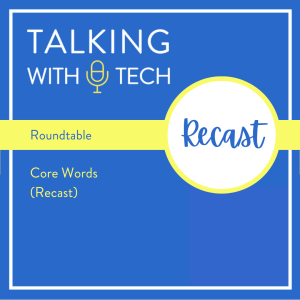
Wednesday Jul 19, 2023
Wednesday Jul 19, 2023
In this “Recast” episode of Talking with Tech, we share a remastered episode that was previously aired on the podcast. This episode is a “roundtable” discussion between previous co-host Lucas Steuber, Christopher Bugaj, and Rachel Madel. They discuss core words, a relatively small set of high-frequency words, often between 100-300, which make up 80% of what we say every day. Teaching core words to AAC users can give the biggest “bang for your buck” compared to teaching many nouns.
Key ideas this week:
🔑 Core words are versatile and can be used to express a wide range of ideas, needs, and wants. Users can combine core words in different ways to create diverse sentences and convey complex messages.
🔑 By focusing on core words, AAC users have the opportunity to learn critical grammar and syntax, including prepositions and pronouns, which can help facilitate overall language development. Nouns are often heavily taught but only make up 20% of what we say.
🔑 Core words are not tied to specific contexts or activities, unlike fringe vocabulary, which includes more specialized or topic-specific words. As a result, core words are useful across different situations and environments, enhancing the user's ability to communicate effectively in various settings.
🔑 There are “personal” core words that are fringe words normally, but may be a core word for that user. For example, the name of the family dog might be a word that one particular AAC user would use frequently.
Visit talkingwithtech.org to access previous episodes, resources, and CEU credits that you can earn for listening to TWT episodes!
Help us develop new content and keep the podcast going strong! Support our podcast at patreon.com/talkingwithtech!
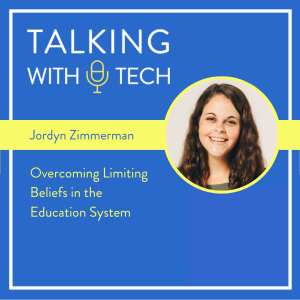
Friday Jun 30, 2023
Friday Jun 30, 2023
This week, Chris and Rachel interview Jordyn Zimmerman, an autistic nonspeaking adult who was featured in the documentary “This is Not About Me.” This is Not About Me covers Jordyn’s journey trying to be included in school and to get access to robust AAC. Jordyn shares about the challenges with an education system that can segregate disabled students without giving them equal opportunities, the problems with “gatekeepers” withholding robust AAC from students, the impact of limiting beliefs, and more!
Before the interview, Chris and Rachel connect with Michaela Ball, the Audio Engineer of Talking with Tech. Michaela shares about how she got connected with the podcast and why she reached out to help several years ago. Chris, Rachel, and Michaela discuss some of their thoughts about Jordan Zimmerman’s documentary, This is Not About Me https://thisisnotaboutme.film/ and talk about the importance of giving AAC users the time they need to finish communicating. Chris and Rachel challenge listeners to wait for Jordyn to respond in this episode rather than fast forwarding as a way to practice giving an AAC user the wait time they need.
Key Ideas this Week:
🔑 Jordyn shares that, in the education system, when students have disabilities, they are put on a path of segregation rather than being given the tools they need to communicate. This is especially true if the student does not use speech to communicate. Once segregated, the opportunities for students within the school and broader community are often limited.
🔑 There remains a big issue with with schools and professionals “gatekeeping,” i.e., requiring that a person meet certain criteria before being given robust AAC. Often, this includes a requirement that a person shows “communicative intent” before they are given robust AAC. Jordyn notes that, as a student, she was asked to demonstrate communicative intent without being given meaningful access to AAC or training on how to use it. For Jordyn, her school believed she would never meaningfully communicate because she had “challenging” behaviors after years without access to communication.
🔑 Jordyn says that she learned a lot of language as a child from listening to her older brother, her parents, and Sesame Street, as well as living in a print-rich environment. Jordyn was learning about language from her home environment long before she had access to robust AAC.
Visit talkingwithtech.org to access previous episodes, resources, and CEU credits that you can earn for listening to TWT episodes!
Help us develop new content and keep the podcast going strong! Support our podcast at patreon.com/talkingwithtech!
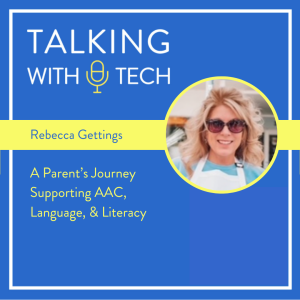
Friday Jun 23, 2023
Friday Jun 23, 2023
This week, Rachel and Chris interview Rebecca Gettings, a parent of an AAC user in Arizona. Her son, Carter, has complex communication needs and uses eye tracking. Rachel shares about her journey from learning about AAC to supporting Carter’s literacy, as well as some of her AAC and inclusion advocacy in Yuma, Arizona.
Before the interview, Chris and Rachel discuss some ways that Rachel has used AI in her practice, including using the Canva AI image creator to create visuals and characters for an original story. Rachel also shares about a client family that has negative feelings about AI, and her realization that she may need to have more conversations with families before using AI in therapy. Chris notes that AI is not “binary” - its not all bad or all good.
Key ideas this week:
🔑 When Rachel is using Chat GPT in therapy and gets an answer that is difficult for her client to understand, Rachel will model writing “Can you simplify that” into to help them get an easier to understand response.
🔑 Turnover has been a big problem for Rebecca and Carter - she frequently teaches Carter’s teachers and SLPs to be good communication partners, only for them to be replaced. When an AAC user’s family learns how to use AAC and become good communication partners, it establishes a consistent source of knowledge and expertise that won’t change as often.
🔑 Rebecca says that the main advice she would give to parents is to “get started learning as soon as possible,” even if it seems overwhelming at first. “Once you understand AAC,” she says, “its super easy, but it’s about making that jump.”
🔑 If you are training parents, don’t worry about training them on things they can search on YouTube, like how to add or remove a button. Focus on getting them comfortable with modeling and identifying activities in their daily routine that are starting points for implementation.
Link from this week’s episode:
SSA’s Spotlight on ABLE Tax Free Savings Accounts for Disabled Individuals: https://www.ssa.gov/ssi/spotlights/spot-able.html
Inspire HI Project - https://www.facebook.com/InspireHIproject/
Visit talkingwithtech.org to access previous episodes, resources, and CEU credits that you can earn for listening to TWT episodes!
Help us develop new content and keep the podcast going strong! Support our podcast at patreon.com/talkingwithtech!
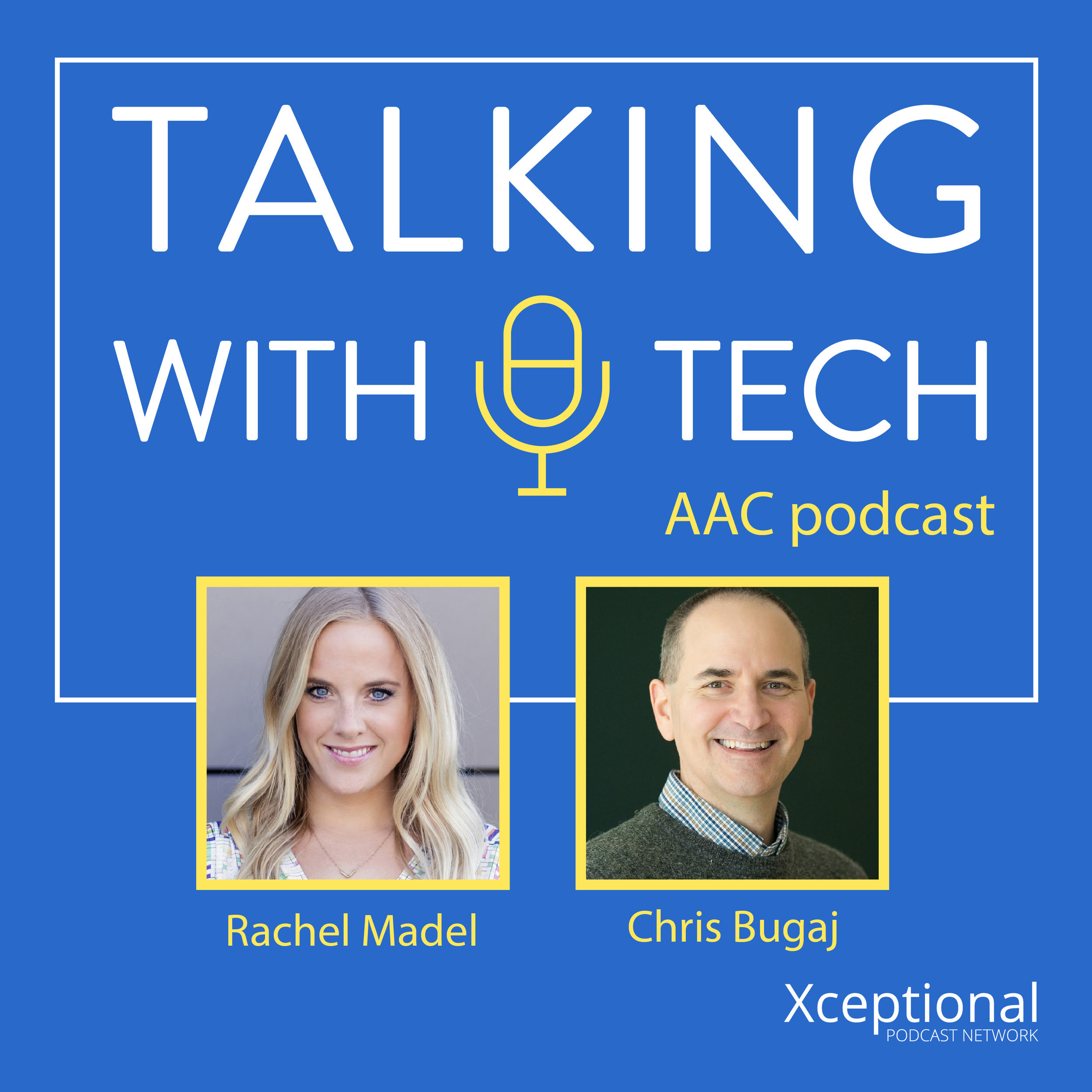
Join AAC experts Rachel Madel and Chris Bugaj as they dive into a weekly discussion about all things AAC (Augmentative and Alternative Communication). Every episode they deliver practical resources, clinical guidelines and relevant research to help clinicians better utilize technology for individuals with complex communication needs.
Episodes include interviews with industry thought-leaders, clinicians, parents, researchers and app developers to keep you on the pulse of the educational technology scene and better support communication through the use of technology.


